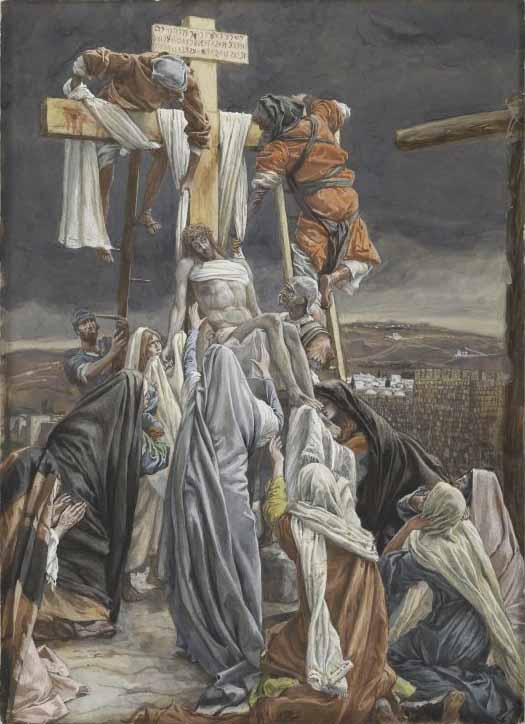Scripture Readings: Isa. 53:4-12; Ps. 91:9-16; Heb. 5:1-10; Mark 10:35-45 Sermon by Martin Manuel from Isaiah 53
Jesus: The Suffering Servant
Introduction
Though most Christians know that the New Testament is all about Jesus, fewer are aware of the prominent place Jesus has in the Old Testament. We see that place in our reading today in Isaiah chapter 53. Is says a great deal, via prophecy, about who Jesus is, what he has done and what he continues to do for our salvation. Let’s take a closer look.
The book of Isaiah
Isaiah, prophet to the ancient Jews, ministered from about 740 to 700 BC. In chapters 41-53, his message is given in four hymns about a person identified as “the suffering servant.” The fourth hymn, found in chapter 53, offers deep insights concerning this person: who he is, what he does, his divine and human natures, and his relationship with all humanity.

(public domain via Wikimedia Commons)
Jesus’ divinity revealed
Sadly, many Jews in Isaiah’s day would not believe his message—Isaiah lamented, “Who has believed our message?” (Isa. 53:1a). The same was true in Jesus’ day—few believed that he was the promised Messiah.
Challenging the unbelief of his countrymen, Isaiah asked, “To whom has the arm of the LORD been revealed?” (Isa. 53:1b). This reminds of the time Jesus told Peter that it was God who revealed to him Jesus’ true identity as the Son of God (Matt. 16:17). Isaiah seems to be speaking here of Jesus, referring to him as “the arm of the Lord”—indeed, Isaiah has a person in mind, not a mere power. Note what Isaiah says in chapter 59:
The LORD looked and was displeased that there was no justice. He saw that there was no one, he was appalled that there was no one to intervene; so his own arm worked salvation for him, and his own righteousness sustained him. (Isa. 59:15b-16)
This person, this powerful “arm of the Lord” sent into the world is the one the prophet, in Isaiah 7:14, identifies as a baby called Immanuel (God with us), and then also Wonderful Counselor, Mighty God, Everlasting Father and Prince of Peace (Isa. 9:6b). These are titles, which taken together, belong only to God, now being said of the “arm of the LORD”—the one we know as Jesus Christ—the Son of God, who through the Incarnation, became the God-man Jesus. He was fully God, yet also fully human.
Jesus’ humanity revealed
The remainder of Isaiah 53 unpacks the dual nature of this Suffering Servant of God, this Arm of the Lord. In Isa. 53:2a, the prophet focuses on his person’s humanity, saying that he “grew up… like a tender shoot.” He then reminds us in chapters 7 and 9 that this person had been both conceived and born. Back in in chapter 53, he describes his human fragility, noting that “he had no beauty or majesty to attract us to him” (53:2b) and that he “was despised and rejected by mankind, a man of suffering, and familiar with pain” (53:3). Though the arm of the LORD (thus possessing great power), his calling included being rejected by humanity, and then suffering to save us:
Surely he took up our pain and bore our suffering, yet we considered him punished by God, stricken by him, and afflicted. But he was pierced for our transgressions, he was crushed for our iniquities; the punishment that brought us peace was on him, and by his wounds we are healed. (Isa. 53:4-6)

(public domain via Wikimedia Commons)
Jesus endured the terrible pain of severe blows to his body and the prolonged torture of the cross. He could only experience such suffering as a human. Isaiah goes on to liken the human race to lost sheep and Jesus to a lamb among those sheep (and thus also human) who silently and without resistance experienced slaughter on behalf of the whole flock:
We all, like sheep, have gone astray, each of us has turned to our own way; and the LORD has laid on him the iniquity of us all. He was oppressed and afflicted, yet he did not open his mouth; he was led like a lamb to the slaughter, and as a sheep before its shearers is silent, so he did not open his mouth. (Isa. 53:6-7)
Jesus lived and suffered as a human. Though not guilty of sin himself, he died on behalf of sinful humanity:
For he was cut off from the land of the living; for the transgression of my people he was punished. He was assigned a grave with the wicked, and with the rich in his death, though he had done no violence, nor was any deceit in his mouth. Yet, it was the Lord’s will to crush him and cause him to suffer… (Isa. 53:8b-10a)
Yes, Jesus, in his humanity, died for us. But that is not the end of the story. Though Jesus died, the grave could not contain him—he was resurrected back to human life, remaining fully human (now glorified). Isaiah says this:
He will see his offspring and prolong his days…. After he has suffered, he will see the light of life and be satisfied…. I will give him a portion among the great, and he will divide the spoils with the strong…. (Isa. 53:10b-12)

(public domain via Wikimedia Commons)
Two natures
Isaiah 53 is an amazing chapter, describing one person with two natures—divine and human. Consider these verses that speak of his deity: arm of the LORD (v. 1), by his wounds we are healed (v. 5), the Lord has laid on him the iniquity of us all (v. 6), he had done no violence nor was deceit in his mouth (v. 9), by his knowledge my righteous servant will justify many (v. 11), he will bear their iniquities (v. 11), he bore the sin of many (v. 12). Then consider these verses that speak of his humanity: he grew up (v. 1), had no beauty or majesty (v. 2), was a man (v. 3), was pierced (v. 5), was crushed (v. 5), had wounds (v. 5), was cut off from the land of the living (v. 8), died and was put in a grave (v. 9), poured out his life unto death (v. 12).
What Isaiah declared prophetically was made real in the life of Jesus, and clarified by the teachings of both Jesus and his apostles. Disputes about that teaching arose within the church in later centuries. To resolve the disputes, church leaders met in councils, with their consensus findings summarized in the great creeds of the early church, including the Chalcedonian Creed, which affirmed and clarified the teaching of Scripture that Jesus is fully human and fully divine—one person with two natures. Centuries later, theologian Karl Barth, in Dogmatics in Outline, summarized that understanding with these words: “True divinity and true humanity in sheer unity.”
[Note to preacher, for more information about these ancient creeds go to https://www.gci.org/articles/three-historic-christian-creeds/ ]
Relationship with humanity
The effect of the Suffering Servant of God on the whole of humanity is eloquently addressed in Isaiah 53:5, which says “by his wounds we are healed.” This metaphorical language speaks of Jesus’ work to heal all our ills: physical, psychological, social and, above all, spiritual. The eternal Son of God provided this healing by assuming our humanity via the Incarnation, and through his life, death, resurrection and ascension, reversing the outcome of the fall, exchanging his righteousness for all our fallenness.
As Isaiah notes, “the Lord…laid on him the iniquity of us all… for the transgression of my people he was punished… though he had done no violence, nor was any deceit in his mouth” (Isa. 53:6b, 8b, 9b).
By bearing the sins of all humanity in himself, Jesus, the Suffering Servant, brought about the justification of humanity (Isa. 53:11). This means that the status humankind had with God, which was lost in Eden, is restored in the humanity of Jesus. Isaiah also declares (in Isa. 53:12) that Jesus, in his humanity, now glorified, makes intercession for sinful humanity. As our high priest in heaven, Jesus ministers to God as our representative, interceding on our behalf.
Conclusion
Brothers and sisters, these profound changes to the state and status of humanity occurred in and through Jesus nearly 2,000 years ago. Let us believe that and rely on that. As the hymn says, “What a friend we have in Jesus!” As we, led by the Spirit, trust and obey Jesus as our Savior and High Priest, we are living into the reality that Jesus has created, in himself, for all humanity. With the mind of Christ at work within us, our wills become subject to our heavenly Father’s will, and the Holy Spirit leads us to take up our cross and follow Jesus in self-sacrificial service.



Please note that comments are moderated. Your comment will not appear until it is reviewed.